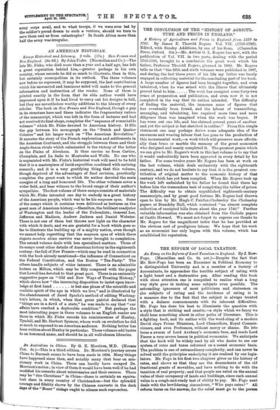AN AMERICAN HISTORIAN.
Essays Historical and Literal. y. 2 vole. (17s.) New France and New England. (8s. 6d.) By John Fiske. (Macmillan and Co.)—The late Mr. Fiske, who died more than a year and a half ago, has left a great reputation behind him,—greater perhaps in his own country, whose records he did so much to illustrate, than in this, but certainly cosmopolitan in its outlook. The three volumes now before us represent, it may be supposed, the last contribution which his unwearied and luminous mind will make to the general information and instruction of the reader. None of them is printed exactly in the form that its able author would have impressed upon it if he had lived to carry out his designs in full, but they are nevertheless worthy additions to the library of every scholar. The book on New France and New England, though a gap in its structure here and there indicates the fragmentary nature of the manuscript, which was left in the form of lectures and had not received its final shape, completes the " sequence of remarkable volumes" which Mr. Fiske devoted to American history. It fills the gap between his monograph on the "Dutch and Quaker Colonies " and his larger work on " The American Revolution." It narrates the story of the French exploration and settlements in the American Continent, and the struggle between them and their Anglo-Saxon rivals which culminated in the victory of the latter on the Plains of Abraham. It thus carries us from Cartier, Champlain, and La Salle to Montcalm and Wolfe. No one who is acquainted with Mr. Fiske's historical work will need to be told that it is a masterpiece of lucid exposition combined with untiring research; and it is a very gratifying thing that this volume, though deprived of the advantages of final revision, practically completes the great work to which its author devoted the main energies of a long and honoured life. The other volumes cover a wider field, and bear witness to the broad range of their author's sympathies. The first volume of these essays consists of materials which Mr. Fiske intended one day to embody in a great history of the American people, which was to be his magnum opus. Some of the essays which it contains were delivered as lectures on the great men of American history,—Hamilton, the brilliant coadjutor of Washington and the leader of the Federalists ; General Lee, Jefferson and Madison, Andrew Jackson and Daniel Webster. There is not one of them but throws new light on the character with which it deals, and we are grateful for a book which goes so far to illustrate the building up of a mighty nation, even though we cannot help regretting that the magnum opus of which these disjecta membra alone survive was never brought to completion. The second volume deals with less specialised matters. Three of its essays treat other details of American history in the eighteenth century: the fall of New France—which may be read in connection with the book already mentioned—the influence of Connecticut on the Federal Constitution, and the Boston " Tea-Party." The others handle subjects of wider interest. There is an admirable lecture on Milton, which may be fitly compared with the pages that Lowell has devoted to that great poet. There is an eminently suggestive paper on " Old and New Ways of Treating History," which shows how " the increasing disposition to insist upon know- ledge at first hand is but one phase of the scientific and realistic spirit of the age in which we live," and is illustrated by the abandonment of Jared Sparks's method of editing Washing- ton's letters, in which, when that great patriot declared that "things are in a devil of a state," he was made to say that "our affairs have reached a deplorable condition." But perhaps the most interesting pages in these volumes to an English reader are those in which Mr. Fiske records his reminiscences of Huxley, Tyndall, and Mr. Herbert Spencer, whose work on evolution he did so much to expound to an American audience. Nothing better has been written about Huxley in particular. These volumes add lustre to an honoured name, and should be in all well-chosen libraries.


























































 Previous page
Previous page